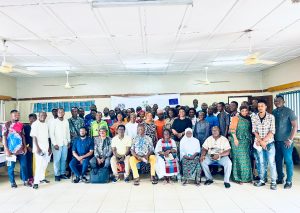Cooperative Dept Concludes North-West Regional Consultations on Review of 1977 Cooperative Societies Act

he Cooperative Department in the Ministry of Trade and Industry (MTI), with support from the International Labour Organization (ILO) and the European Union, on Saturday, 9th August 2025, concluded a series of Regional Stakeholders’ Consultative Workshops on reviewing the Cooperative Societies Act of 1977. The sessions were held in the North-West region—specifically in Makeni and Port Loko Districts.
In Makeni, the meeting took place at the Sierra Leone Teachers’ Union Regional Headquarters, while in Port Loko, it was hosted at the Ministry of Agriculture. The workshops brought together over 130 participants, including teachers, farmers, miners, and commercial motorbike riders from various cooperatives, as well as representatives from the Ministry of Planning and Economic Development, civil society organisations, and the media.
Cooperatives in Sierra Leone date back to 1944, and the review of the outdated Act is intended to align cooperative governance with modern development needs. Participants were urged to be attentive, contribute meaningfully, and take collective responsibility for moving the country forward. It was also highlighted that agricultural cooperatives could significantly boost rice production and other sectors—citing China, where agricultural farmers are among the wealthiest citizens.
The workshops were facilitated by Mr. Newton Marlin, Registrar of Cooperatives in the Ministry of Trade and Industry, and Mr. Max Kossy-Sesay, Deputy Director of Planning, Policy, and Research. An overview of the workshop objectives and expected outcomes was presented by Francis Jabati Esq., Director of Planning, Policy, and Research at the Trade Ministry.
Mr. Jabati stated that President Julius Maada Bio, the Minister, and the entire Ministry are eager to finalise and enact the new policy as a lasting legacy before leaving office. Mr. Kossy-Sesay explained that cooperatives exist to help members support each other, with loans offered at minimal interest rates. He stressed that the review would formalise and strengthen sectors such as commercial motorbike riding, mining, and farming. He also noted the lack of a savings culture in Sierra Leone and across Africa, urging the need to instil savings habits in young people through school sensitisation.
Mr. Marlin underscored that the government aims to create wealth for citizens at all levels, pointing out that both Sierra Leone and Liberia operate under outdated cooperative laws—the latter dating back to 1936. He encouraged participants to make strong contributions towards developing a law that will stand the test of time, assuring them that donors are ready to support cooperatives once the review is complete. Citing examples from abroad, he noted that Canada has nine million cooperative members, while Ethiopia has 36,000.
The Registrar emphasised that the new Act should address modern challenges and opportunities, including climate change, gender equality, technology, disease outbreaks, offences and penalties, independent audits, members’ rights, dispute resolution mechanisms, and checks and balances for appointing cooperative leadership. Credit Unions—financial cooperatives currently absent from the 1977 Act—would also be included in the new framework, either as a dedicated section or through specific amendments, to distinguish them legally from non-financial cooperatives.
Additional key issues discussed included:
- Amalgamation of cooperatives to strengthen capacity.
- Continuous training and supervision of cooperators.
- Decentralised registration processes and clear definitions of communities.
- Security of members’ contributions and the establishment of a Central Financial Facility as a security bond.
- Updated registration/incorporation rules, including minimum capital, permitted activities, common bond requirements, governance templates, and fit-and-proper tests for officers.
- Prudential and financial requirements for deposit-taking cooperatives, governance standards, accounting, audit, and reporting obligations.
During the question-and-answer session, participants noted that most businesses in Sierra Leone operate in the informal sector with significant untapped resources. They also disclosed that the country currently has over 400 agricultural cooperatives and 29 Credit Unions, with the National Association of Credit Union Associations (NaCCUA) serving as the apex body for dispute resolution.
The Cooperative Department confirmed that similar stakeholder engagements will be held in the South-East to ensure nationwide input before presenting the final document to Cabinet and Parliament for approval.





